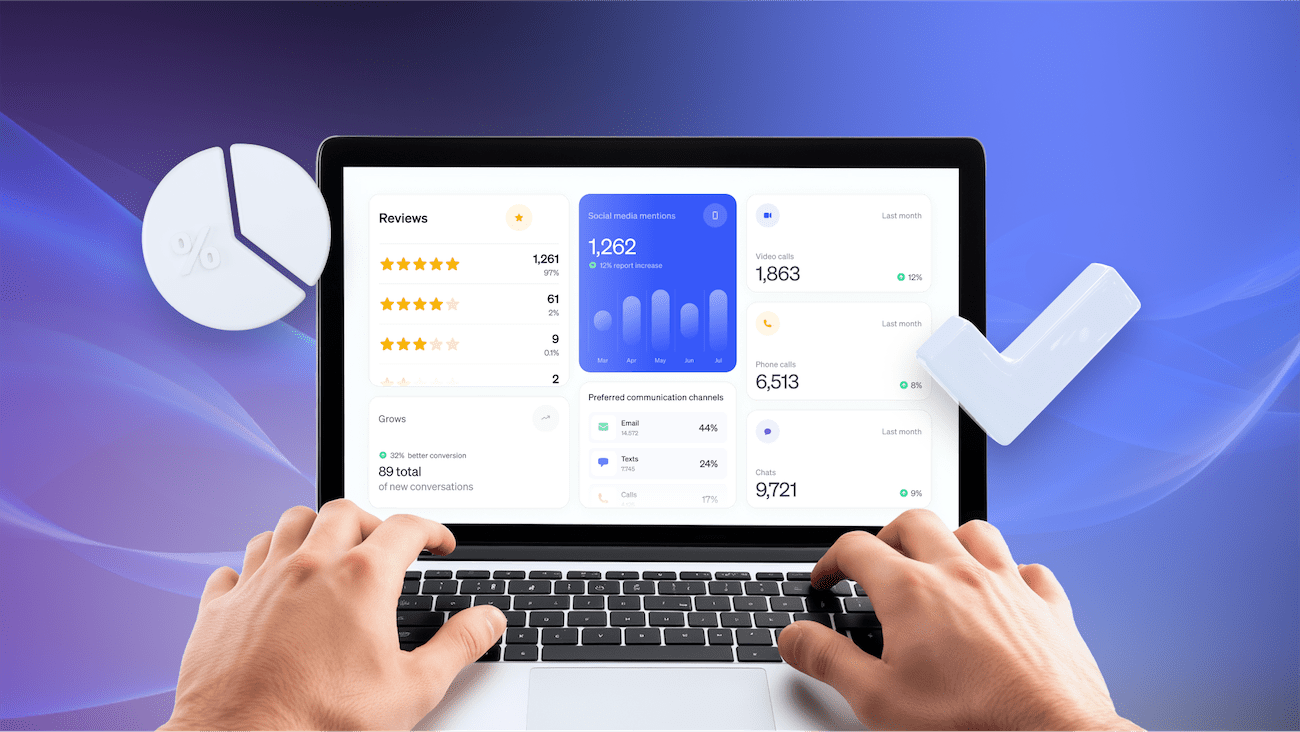Choosing a new contact center software can be exciting but a little overwhelming. This software will directly impact your operational processes, your call center agents’ experience, and, ultimately, the customer experience. But what are the key contact center requirements?
It’s essential to conduct an extensive analysis to determine whether contact center software can be technically implemented efficiently. In this post, we’ll discuss the software, hardware, and connectivity requirements for running an effective contact center solution and additional factors to keep in mind.
Software Requirements for Contact Center as a Service
When implementing Contact Center as a Service (CCaaS) software, the first thing to address is software requirements. You’ll want to assess the software you’re already running in your business and consider the software requirements you need from the CCaaS solution you choose.

Operating system compatibility
The contact software you choose must support major operating systems like Windows, macOS, or Linux. It may be worth selecting a CCaaS provider with ready-made solutions on many operating systems, even if your entire organization only uses one, because that may change over time.
It’s also essential to ensure that you’re updating your company operating systems regularly to maintain performance, security, and reliability.
Updated web browsers
WebRTC calling is a free, open internet framework that enables real-time communication in web browsers and mobile apps thanks to APIs. Some CCaaS providers may offer WebRTC features, which can help provide softphone functionality without extra tools.
However, to leverage WebRTC calls, you need to ensure browsers like Chrome, Firefox, and Edge are up to date. Updated browsers are often essential to ensure compatibility and security.
CRM integration
Your CRM systems can track customer interactions across multiple communication channels, including outbound and inbound calls, SMS messages, email, website chatbot conversations, and potentially even social media.
Your contact center software solutions need to seamlessly integrate with your CRM to provide agents with essential customer data. This can help agents deliver exceptional and personalized customer support, and CTI functionality ensures a smooth handoff when answering or placing calls.
Popular CRMs include HubSpot, Salesforce, and Zoho CRM.
API and third-party app support
One of the most important call center software requirements is API and third-party app support. The solution you choose should support APIs to integrate it with other key business tools, including analytics platforms, reporting tools, email software, and social media.

This may help you provide omnichannel customer support but can also provide essential insight to improve overall call center operations.
Cloud compatibility
For cloud-based solutions, ensure you’re using a reliable cloud environment such as AWS, Azure, or Google Cloud to host the software. If you’re already using a particular cloud environment, ensure it will work well with the contact center solution you’re considering.
Some platforms may offer their own hosting. Nextiva, for example, provides the software, support, and hosting with its contact center solution, giving your organization one less thing to worry about.

Compliance features
When reviewing call center software features, don’t overlook compliance. Any software you choose should support current security and privacy best practices and any federal, local, or industry regulations that impact your business.
Common examples include:

These regulations will ensure the secure handling of sensitive data and may have specific requirements about what data can be shared, recorded, or tracked.
Hardware Requirements for Contact Centers
Certain hardware requirements apply to running a contact center, especially if you want to get the most out of the platform.
High-quality headsets
Noise-canceling headsets are crucial for clear communication, minimizing background noise and enhancing voice quality during calls. VoIP headsets also integrate the software with the headset’s buttons, increasing ease of use and agent performance.

Learn more about different types of VoIP hardware.
Computer hardware
Modern PCs and laptops may have sufficient processing power and RAM to handle multiple applications simultaneously, but if not, this is a must-have. When possible, select Gigabit networking over Wi-Fi for improved performance.
Monitors
Dual-monitor setups are optional but highly recommended, as they can improve agent productivity. Multiple monitors help agents manage multiple windows and applications effectively, with a single support agent able to see scripting recommendations on one screen while reviewing past customer interactions in your CRM on another.

VoIP phones
While not always required, VoIP phones can enhance communication for agents who prefer hardware over softphone applications, especially for those working on premises. They can even work using Power over Ethernet (PoE), which allows network cables to carry both data connection and electrical power to devices.
See how to set up a VoIP system to learn more.
CCaaS Network and Connectivity Requirements
Network and connectivity can directly impact how well your CCaaS system works and should not be overlooked when choosing a system. Let’s review what you need to run a CCaaS solution reliably to ensure a high-quality service.
Wired broadband
A stable, high-speed wired internet connection is essential to avoid call drops and latency issues. While there are tips to reduce VoIP data usage, the reality is that call center operations relying on digital communication use a significant portion of data, and that means you need lightning-fast internet.
Alternatively, 5GHz and 6GHz Wi-Fi is an acceptable alternative if a wired internet connection isn’t available.
Quality of Service
You can implement network Quality of Service (QoS) settings to prioritize voice traffic over other activities. This can ensure that call quality remains high, even when the network is otherwise congested.
Keep in mind that customer satisfaction can drop quickly if your calls drop, making VoIP call quality an essential priority for call centers.
VPN and firewall configuration
More call center agents are now working remotely than ever before, with an estimated 87% of agents working from home at least some of the time. This can present potential security concerns, so secure VPN access and proper firewall configurations are essential for remote agents. They can protect sensitive customer data and ensure security and privacy compliance.
Additional Considerations Before Choosing a Vendor
While we’ve covered the big requirements you need to run a CCaaS system effectively, there are a few more things to keep in mind. Before choosing a call center software vendor, make sure you consider the following:
Call recording and storage
If call center recording is required or encouraged in your organization, you want to ensure sufficient cloud or local storage to properly archive recordings and/or their transcripts with encryption for data security.
SIP compatibility
The software you choose should support SIP trunking for higher volume call handling.

These digital systems are increasingly popular with businesses of all sizes today, allowing them to handle increased call volume while benefiting from CCaaS key features like the following:
- Predictive dialers for outbound calls
- Interactive voice response (IVR) systems to direct callers to the right person
- Automatic call distribution for incoming calls
- Automation to streamline workflows and improve productivity
- User-friendly dashboards
- Analytics to track essential metrics and KPIs, potentially including advanced features like sentiment or speech analytics
- Call monitoring for quality management
- Intelligent call routing, including skill-based routing
If you’re not ready for a contact center, you can benefit from Nextiva’s business VoIP phone system to streamline your team and customer communications.
Mobile device support
Ensure that the call center software you choose is compatible with mobile devices. Ideally, agents should be able to download mobile apps so they can work remotely via smartphones, tablets, or softphones if needed, even if they’re on the go.

Don’t forget to check specific device compatibility. Some systems may only support specific operating systems, so choose software with mobile apps for both Android and iOS when possible.
Professional services and onboarding
It takes more than software to deploy a contact center. This is where professional service delivery comes into play to align the business needs, technology resources, and sets in motion the training, so you have a successful launch.

Not all contact center providers offer this, so be ready with project management resources or ask about implementation services available.
Nextiva: The Flexible Cloud Contact Center Solution
Most organizations look for essential features like call routing and IVR when choosing a contact center solution, but it’s crucial to make sure that you have the latest hardware, software, and connectivity requirements in place and that the CCaaS software is compatible with your current systems (including your CRM, third-party software, and operating systems).

Ensuring that all the details line up can set the stage for a strong partnership and help both implementation and adoption go smoothly.
Nextiva Contact Center is well suited for most business needs, regardless of your size or industry. Our transparent pricing allows you to choose a plan that can scale as needed, and our system works wherever and whenever. Whether your contact center team is in the office or working remotely, we’ll work with you during implementation to ensure you’re set up for success.
Do you have your requirements ready? Talk with a product expert and see why Nextiva is the best AI-powered contact center. 👇
Top AI-Powered Contact Center Solution
Transform your customer interactions with a contact center platform that saves you time and money, reduces agent and supervisor stress, and flexibly adapts to fit your needs.

















 Productivity
Productivity 










